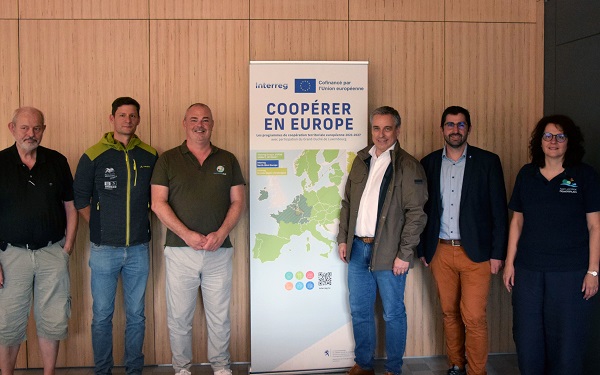 (L-R) Frank Rockenbrod, National Liberation Memorial; Claude Petit, Natur- & Geopark Mëllerdall; Daniel Gliedner, Naturpark Our; Claude Meisch, Minister of Housing & Spatial Planning; Jeff Gangler, Boulaide Mayor; Christine Lutgen, Upper Sûre Nature Park;
Credit: Upper Sûre Nature Park
(L-R) Frank Rockenbrod, National Liberation Memorial; Claude Petit, Natur- & Geopark Mëllerdall; Daniel Gliedner, Naturpark Our; Claude Meisch, Minister of Housing & Spatial Planning; Jeff Gangler, Boulaide Mayor; Christine Lutgen, Upper Sûre Nature Park;
Credit: Upper Sûre Nature Park
On Thursday 1 August 2024, Claude Meisch, Luxembourg's Minister of Housing and Spatial Planning, who is also responsible for the implementation of European territorial cooperation programmes (Interreg) in the Grand Duchy, met with representatives of Luxembourg nature parks involved in several Interreg projects.
"The implementation of cross-border cooperation projects on several scales demonstrates in an eloquent and concrete manner the importance of European cooperation," explained Minister Meisch. "They represent clear examples of a Europe close to the citizen and of a cross-border area experienced on a daily basis. Such initiatives are essential to further promote territorial cohesion in the Greater Region and beyond. They are also close to my heart, because the nature parks cooperate with partners across Europe through the Interreg programmes, two areas that concern my skills as Minister of [Spatial] Planning."
As reported by Luxembourg's Ministry of Housing and Spatial Planning, the Department of Spatial Planning (DATer) plays a key role in the implementation of the Interreg programmes in Luxembourg. As the national authority for the Interreg Greater Region, North-West Europe and Europe programmes, the department organises the national instruction of projects that have Luxembourg partners and determines the national position during the monitoring committees of the respective programmes. Between 2014 and 2020, 126 Luxembourg partners participated in 81 projects across all scales of territorial cooperation and for which approximately €37 million in European co-financing was approved. During the current period (2021-2027), Luxembourg partners are cooperating in 46 projects for which €13.5 million has been approved so far.
As the managing authority of the Interreg Greater Region programme, the DATer, together with its partners in the Grand Est region (France), ensures its proper implementation by managing discussions on political priorities and technical aspects during the various programming periods. The managing authority also ensures the practical application of European rules and the programme and is assisted in this task by the joint programme secretariat located at the Maison de la Grande Région in Esch-sur-Alzette.
With the launch of the current programming period, the Interreg Greater Region programme has also launched functional zones. These allow local stakeholders on both sides of the border to identify and work towards resolving cross-border issues in their region that impact their inhabitants.
During the visit, Minister Meisch took the opportunity to promote future calls for projects at all levels. "For structures wishing to cooperate across borders, this is an opportunity to join a community committed to the transformation and improvement of our region. Whether for small projects or large-scale initiatives, Interreg offers the necessary support to cross borders and bring innovative and promising ideas to fruition," he stressed.
The ministry added that, for more than 30 years, Interreg has been promoting collaboration between local and regional partners across Europe, enabling projects to be carried out that make cross-border and transnational territories greener, more social and "above all" closer to citizens while helping to develop better governance.
The Interreg Greater Region and North-West Europe programmes continue to organise calls to co-finance territorial cooperation projects for the 2021-2027 programming period.








